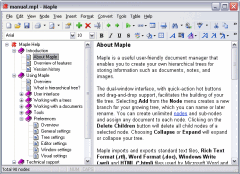Nearly two years after my original post on Linux software for academics, I’ve officially made the switch to Linux. To be specific, I installed Linux Mint 10 as my primary OS. I was originally planning to go with Ubuntu, but after reading this interesting post over at Lifehacker (“Why Linux Mint Might Be a Better Beginner’s Linux Than Ubuntu”), and doing a bit more research, I decided to go for the latest version of Linux Mint instead.
So, how am I dealing with the switch? Surprisingly well. I’m thoroughly enjoying the interface of the new OS– Linux Mint 10 (“Julia”) is beautifully designed. My main concern was that finding replacements for favourite and often-used Windows programs would be something of a challenge, but so far so good.
Here are my suggestions for replacement or equivalent software alternatives for academics making the switch from Windows to Linux:
Happily, Firefox runs wonderfully in Linux (hurrah for open source!). I’d miss my plugins, especially customized searches for Google Scholar, WorldCat, and Wikipedia.
There are some interesting Linux-compatible programs in development right now that hold potential for academics switching to Linux. I’ll be keeping a keen eye on updates for the following:
Zotero Standalone
“We are excited to announce the alpha release of standalone Zotero, part of the larger Zotero Everywhere project. Standalone Zotero Alpha does not require Firefox to run and is available for Mac OS X, Windows, and Linux.”
Scrivener for Linux
“Scrivener isn’t meant to replace OpenOffice Writer for dedicated word processing needs but rather for help in ‘structuring and writing those difficult first drafts of long texts such as novels, scripts and thesis’.”
LyX-Outline
“LyX-Outline is a forthcoming add-on to the popular document processor, LyX, that will give it many of the same features as the writing tool, Scrivener. This add-on is a recognition that writing is about more than just plugging away at a piece of prose until it is finished. It’s also about tracking down loose ends, trying to visualize structure, and avoiding as many dead-ends as possible. In a word, it’s about getting from first to final draft by the quickest route possible, which may not necessarily be a straight line.”
Filed under: Academia, Bibliographies, Bibliography, Computer, Email, Files, Linux, Open-Source, Organization, PDF, Research, Software, Ubuntu, Writing




